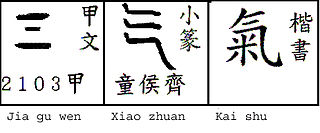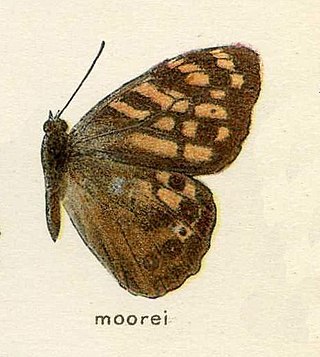
China, officially the People's Republic of China (PRC), is a country in East Asia. It is the world's second-most populous country with a population exceeding 1.4 billion. China spans the equivalent of five time zones and borders fourteen countries by land, tied with Russia as having the most of any country in the world. With an area of nearly 9.6 million square kilometres (3,700,000 sq mi), it is the world's third largest country by total land area. The country consists of 22 provinces, five autonomous regions, four municipalities, and two semi-autonomous special administrative regions. The national capital is Beijing, and the most populous city and largest financial center is Shanghai.

Confucianism, also known as Ruism or Ru classicism, is a system of thought and behavior originating in ancient China, and is variously described as a tradition, philosophy, religion, way of governing, or way of life. Confucianism developed from what was later called the Hundred Schools of Thought from the teachings of the Chinese philosopher Confucius (551–479 BCE). Confucius considered himself a transmitter of cultural values inherited from the Xia (c. 2070–1600 BCE), Shang (c. 1600–1046 BCE) and Western Zhou dynasties (c. 1046–771 BCE). Confucianism was suppressed during the Legalist and autocratic Qin dynasty (221–206 BCE), but survived. During the Han dynasty, Confucian approaches edged out the "proto-Taoist" Huang–Lao as the official ideology, while the emperors mixed both with the realist techniques of Legalism.

Kong Fuzi, commonly Latinized as Confucius, was a Chinese philosopher of the Spring and Autumn period who is traditionally considered the paragon of Chinese sages. Confucius's teachings and philosophy underpin East Asian culture and society, remaining influential across China and East Asia to this day. His philosophical teachings, called Confucianism, emphasized personal and governmental morality, correctness of social relationships, justice, kindness, and sincerity.

Chiang Kai‐shek, also known as Jiang Zhongzheng and Jiang Jieshi, was a Chinese politician, revolutionary, and military leader who served as the leader of the Republic of China and the Generalissimo from 1928 to his death in 1975 – until 1949 in Mainland China and from then in Taiwan. Following the Kuomintang's defeat by the Chinese Communist Party in the Chinese Civil War, he continued to lead the ROC government in Taiwan until his death.

Li Lianjie, better known by his stage name Jet Li, is a Chinese-born Singaporean martial artist, retired Wushu champion, film actor, film producer, and philanthropist. He is widely regarded as one of the most iconic Chinese film stars and one of the most renowned martial arts stars of his generation.

Mao Zedong was a Chinese politician, political theorist, military strategist, poet, and communist revolutionary who was the founder of the People's Republic of China (PRC), which he led as the chairman of the Chinese Communist Party from the establishment of the PRC in 1949 until his death in 1976. Ideologically a Marxist–Leninist, his theories, military strategies, and political policies are collectively known as Maoism.

In traditional Chinese culture and the East Asian cultural sphere, qi, also ch'i in Wade–Giles romanization or chi, is believed to be a vital force forming part of any living entity. Literally meaning "vapor", "air", or "breath", the word qi is a polysemous word often translated as "vital energy", "vital force", "material energy", or simply as "energy". Qi is the central underlying principle in traditional Chinese medicine and in Chinese martial arts. The practice of cultivating and balancing qi is called qigong.

Taiwan, officially the Republic of China (ROC), is a country in East Asia. It is located at the junction of the East and South China Seas in the northwestern Pacific Ocean, with the People's Republic of China (PRC) to the northwest, Japan to the northeast, and the Philippines to the south. The territories controlled by the ROC consist of 168 islands with a combined area of 36,193 square kilometres. The main island of Taiwan, also known as Formosa, has an area of 35,808 square kilometres, with mountain ranges dominating the eastern two-thirds and plains in the western third, where its highly urbanized population is concentrated. The capital, Taipei, forms along with New Taipei City and Keelung, the largest metropolitan area in Taiwan. Other major cities include Taoyuan, Taichung, Tainan, and Kaohsiung. With around 23.9 million inhabitants, Taiwan is among the most densely populated countries in the world.

Taoism or Daoism refers to a Chinese philosophy, or a set of Chinese traditions and religions which emphasize living in harmony with the Tao. The Tao is generally defined as the source of everything and the ultimate principle underlying reality. The Tao Te Ching and the Zhuangzi are widely considered key Taoist texts, and are distinctly philosophical in nature and theme.

Laozi, also romanized as Lao Tzu and various other ways, was a semi-legendary ancient Chinese Taoist philosopher, credited with writing the Tao Te Ching. Laozi is a Chinese honorific, generally translated as "the Old Master". Although modern scholarship generally regards him as a fictional person, traditional accounts say he was born as Li Er in the state of Chu in the 6th century BC during China's Spring and Autumn Period, served as the royal archivist for the Zhou court at Wangcheng, met and impressed Confucius on one occasion, and composed the Tao Te Ching in a single session before retiring into the western wilderness.

Yao Ming is a Chinese basketball executive and former professional player. He played for the Shanghai Sharks of the Chinese Basketball Association (CBA) and the Houston Rockets of the National Basketball Association (NBA). Yao was selected to start for the Western Conference in the NBA All-Star Game eight times, and was named to the All-NBA Team five times. During his final season, he was the tallest active player in the NBA, at 2.29 m.

Chinese folk religion, also known as Chinese popular religion, comprehends a range of traditional religious practices of Han Chinese, including the Chinese diaspora. Vivienne Wee described it as "an empty bowl, which can variously be filled with the contents of institutionalised religions such as Buddhism, Taoism, Confucianism and Chinese syncretic religions”. This includes the veneration of shen (spirits) and ancestors, exorcism of demonic forces, and a belief in the rational order of nature, balance in the universe and reality that can be influenced by human beings and their rulers, as well as spirits and deities. Worship is devoted to deities and immortals, who can be deities of places or natural phenomena, of human behaviour, or founders of family lineages. Stories of these gods are collected into the body of Chinese mythology. By the Song dynasty (960-1279), these practices had been blended with Buddhist doctrines and Taoist teachings to form the popular religious system which has lasted in many ways until the present day. The present day government of mainland China, like the imperial dynasties, tolerates popular religious organizations if they bolster social stability but suppresses or persecutes those that they fear would undermine it.

Xi Jinping is a Chinese politician who has been serving as the general secretary of the Chinese Communist Party, chairman of the Central Military Commission and the president of the People's Republic of China. He is the fifth paramount leader of the PRC since its foundation in 1949.

Humanistic Buddhism is a modern philosophy practiced by Buddhist groups originating from Chinese Buddhism which places an emphasis on integrating Buddhist practices into everyday life and shifting the focus of ritual from the dead to the living.

BirdLife International is a global partnership of non-governmental organizations that strives to conserve birds and their habitats. BirdLife International's priorities include preventing extinction of bird species, identifying and safeguarding important sites for birds, maintaining and restoring key bird habitats, and empowering conservationists worldwide.

Rhaphicera moorei, the small tawny wall, is a species of satyrine butterfly found in western China, India and Tibet.

Ang Lee is a Taiwanese filmmaker. Born in Pingtung County of southern Taiwan, Lee was educated in Taiwan and later in the United States. As a filmmaker Lee's work is known for its emotional charge and exploration of repressed, hidden emotions. During his career, he has received international critical and popular acclaim and a range of accolades.

The 14th Dalai Lama, known to the Tibetan people as Gyalwa Rinpoche, is, as the incumbent Dalai Lama, the highest spiritual leader and head of Tibet. He is considered a living Bodhisattva; specifically, an emanation of Avalokiteśvara in Sanskrit and Chenrezig in Tibetan. He is also the leader and a monk of the Gelug school, the newest school of Tibetan Buddhism, formally headed by the Ganden Tripa. The central government of Tibet, the Ganden Phodrang, invested the Dalai Lama with temporal duties until his exile in 1959.

Rhaphicera satricus, the large tawny wall, is a species of satyrine butterfly found in western China, India and Tibet.
Parargina is a subtribe of butterflies of the subfamily Satyrinae.



















